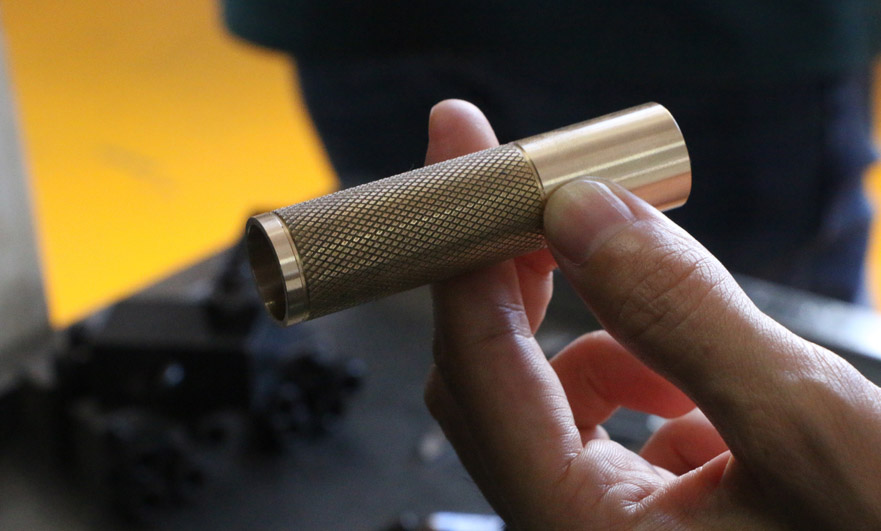Knurling is a common surface treatment of CNC precision parts. In order to make the metal beautiful and practical, the straight-grain knurling machining process is performed on the surface or other parts. The main function of knurling is to prevent slippage, so the main inspection index for customized precision machined parts is appearance quality. This article mainly talks about custom precision machining with milling method for straight knurling and how to improve the quality of appearance?
How is knurling formed?
Knurling is a mechanical process for rolling patterns on metal handles or other work surfaces. It is generally formed by rolling with a knurling knife on a custom precision machining lathe. The patterns are straight and net. Use knurling cutters to squeeze customized precision machined parts to plastically deform the surface to form patterns.
custom precision machining materials are available, such as aluminum alloy, stainless steel, etc. We take 1Cr18Ni9Ti stainless steel as an example. In the process of custom precision machining, a pin shaft part needs to be processed with straight grain m0.5 knurling. The process was arranged for roll forming on a CNC lathe, but after finishing processing on a custom precision machining lathe, it was found that the parts were not smooth, the rolled straight lines were not straight, and the depth did not meet the requirements of the drawing, and the processing could not be carried out.
From the above description, we can find the following two reasons:
1. The reason for the material
The Cr18Ni9Ti material has a strong affinity for other metal materials. In the custom precision machining and cutting process, the tool is prone to build-up edge, and it is not easy to obtain a machined surface with a high surface roughness level. In addition, the custom precision machining has a strong tendency to work hardening, which is easy to make the tool. Wear and affect the surface roughness of the workpiece.
2. The fit between the tool and the knurled road
Custom precision machining lathe knurling belongs to extrusion molding. Plastic deformation occurs when the knurling tool contacts the outer surface of the custom precision machining part. However, the working environment of the CNC lathe is closed. The knurled roads of custom precision machined parts cannot be meshed, which is the main reason for the distortion of the straight lines.

The improvement method of custom precision machining straight grain knurling
After analyzing the above reasons, in order to ensure that the straight knurling can be processed. Therefore, we can only find another way. First, we will have an in-depth understanding of the straight-grain knurling. The pattern shape of the straight-grain knurling is to use a knurling knife to roll the surface of a custom precision machined part into a 90° straight pattern. If the size is known, it can be considered to use a milling cutter to machine straight grooves on a vertical machining center with a rotary indexing head, that is, “milling instead of rolling”.
From the straight groove formula Z=D÷m (D is the diameter of the outer circle, m is the modulus, and Z is the number of grooves), the specific number of grooves can be processed, and then customized precision processing can be carried out. After the processing is completed, the geometry of the parts has a good appearance, and the circumferential surface is smooth and free of burrs, etc., and then is fully qualified by the quality inspection department. Such custom precision machined parts are good straight knurled parts.
Summarize
Not all knurling is suitable for this custom precision machining method. In the article, we talked about finishing parts processing by milling, which is a new custom precision machining concept. This method is just for reference. I hope you can get inspiration in this article and continuously improve the processing of parts from an innovative perspective.